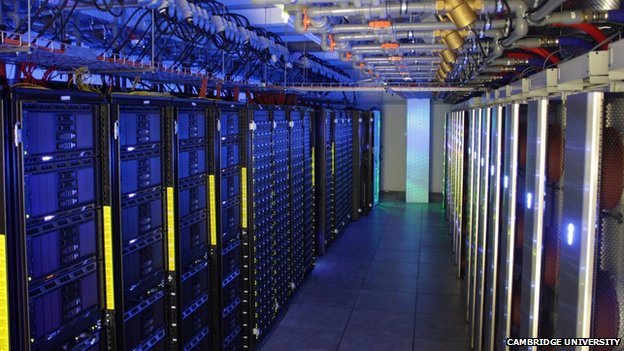Rated second in the Green 500 — a rank of honor celebrating the most efficient supercomputers globally — ‘Wilkes’ is an air-cooled supercomputer developed at the University of Cambridge. The first system in the list is built by a team from Tokyo, but it’s an oil-cooled system, so Wilkes gets pushed ahead as the greenest in its kind. Named after computer pioneer Maurice Wilkes, the highly energy-efficient machine delivers a performance equivalent to that derived from 4000 desktop computers running together, and can process process more than 137 million messages a second. Designed and developed by the in-house engineering team within the Cambridge High Performance Computing Service, Wilkes registers an energy efficiency of 3,361 Mega-flops per watt. The computer shall be used in the development of the Square Kilometer Array (SKA), the biggest radio telescope ever developed in the world. *‘Flops’ (or Floating Point Operations per second) are the standard measure of computer performance.

Dr Paul Calleja, Director of the Cambridge High Performance Computing Service, said- “Energy-efficiency is the biggest single challenge in supercomputing today and our new system makes an important step forward in this regard.” Cambridge is leading the design of the computational platform incorporated within the ambitious international program SKA. By detecting and studying radio waves with unprecedented sensitivity and fidelity, the facility shall be able to shed some more light on the Universe, and also sought is the answer to – Are we alone?
Maurice Wilkes is the man behind the first programmable computer EDSAC which was put out to general use. Developed in 1946, it pushed Cambridge way ahead in digital revolution. This new supercomputer aims to repeat that, and maybe that’s the reason why they’ve named it Wilkes.
Rated second in the Green 500 — a rank of honor celebrating the most efficient supercomputers globally — ‘Wilkes’ is an air-cooled supercomputer developed at the University of Cambridge. The first system in the list is built by a team from Tokyo, but it’s an oil-cooled system, so Wilkes gets pushed ahead as the greenest in its kind. Named after computer pioneer Maurice Wilkes, the highly energy-efficient machine delivers a performance equivalent to that derived from 4000 desktop computers running together, and can process process more than 137 million messages a second. Designed and developed by the in-house engineering team within the Cambridge High Performance Computing Service, Wilkes registers an energy efficiency of 3,361 Mega-flops per watt. The computer shall be used in the development of the Square Kilometer Array (SKA), the biggest radio telescope ever developed in the world. *‘Flops’ (or Floating Point Operations per second) are the standard measure of computer performance.
Dr Paul Calleja, Director of the Cambridge High Performance Computing Service, said- “Energy-efficiency is the biggest single challenge in supercomputing today and our new system makes an important step forward in this regard.” Cambridge is leading the design of the computational platform incorporated within the ambitious international program SKA. By detecting and studying radio waves with unprecedented sensitivity and fidelity, the facility shall be able to shed some more light on the Universe, and also sought is the answer to – Are we alone?
Maurice Wilkes is the man behind the first programmable computer EDSAC which was put out to general use. Developed in 1946, it pushed Cambridge way ahead in digital revolution. This new supercomputer aims to repeat that, and maybe that’s the reason why they’ve named it Wilkes.